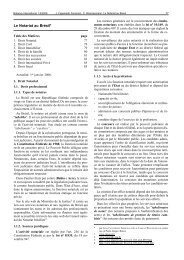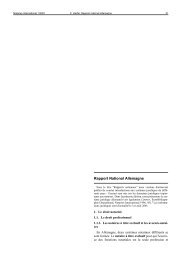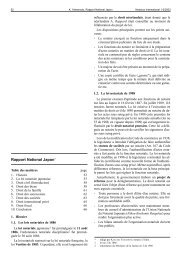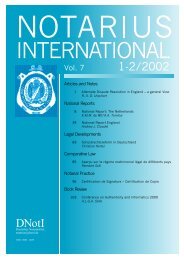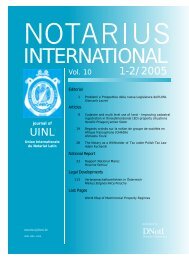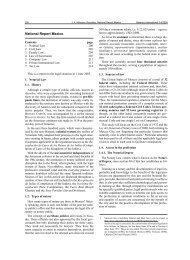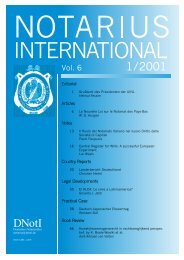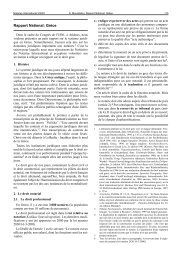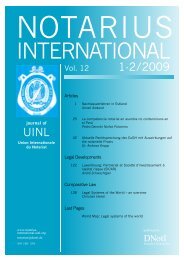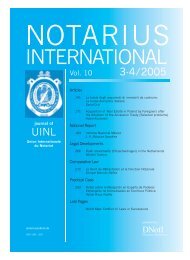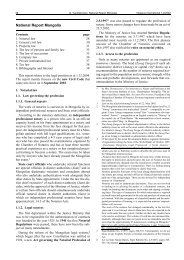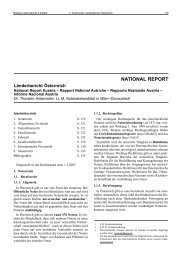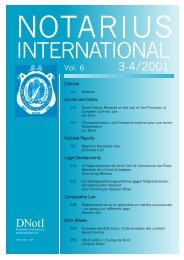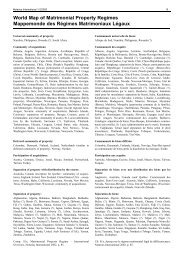ARTICLES and NOTES - Notarius International
ARTICLES and NOTES - Notarius International
ARTICLES and NOTES - Notarius International
Create successful ePaper yourself
Turn your PDF publications into a flip-book with our unique Google optimized e-Paper software.
260 R. Frimston/R. A. D. Urquhart, La Vie en France <strong>Notarius</strong> <strong>International</strong> 3-4/2002<br />
It has been argued by Henry Dyson <strong>and</strong> Keith Croft in<br />
Solicitors Journal of 15th February 2002 that in relation<br />
to an SCI, if its constitution specifically provides that no<br />
member may be a gérant <strong>and</strong> that his powers are spelt out<br />
<strong>and</strong> that in practice such a gérant is appointed <strong>and</strong> operates<br />
independently as such, that this may be sufficient to<br />
ensure that there is no member who is a director or shadow<br />
director, so that no benefit in kind problem ensues.<br />
We do have some difficulties with this view. In practise<br />
we doubt that many clients will be prepared to follow this<br />
course <strong>and</strong> in addition it is clear that the intuitus personae<br />
nature of the members of an SCI make this very difficult<br />
to argue, even if the tests in Deverell were overcome.<br />
It may be preferable to avoid the use of a société civile<br />
immobilière, if possible. However, in circumstances<br />
where the benefits of its use, by allowing owners of properties<br />
in France to organise their property holdings effectively<br />
<strong>and</strong> carry out some estate planning, by turning<br />
French immovable property subject to French succession<br />
law into movable property subject to the law of the individual’s<br />
domicile, outweigh the disadvantages, then the<br />
problem of the potential benefit in kind must be faced.<br />
3.2. Tax Bulletin issues 39 <strong>and</strong> 50<br />
The Tax Bulletins specifically refer to foreign business<br />
entities <strong>and</strong> the distribution of profits.<br />
In the circumstances of a société civile immobilière<br />
holding French immovable property for the benefit of<br />
United Kingdom taxpayers <strong>and</strong> which property is not let,<br />
if the société civile immobilière is not carrying on any<br />
business activity <strong>and</strong> not creating profits, then one may<br />
argue that as stated in Tax Bulletin issue 39 whether a<br />
société civile immobilière is transparent or opaque will<br />
not necessarily be the same in all cases <strong>and</strong> that, in these<br />
circumstances, the classification in Tax Bulletin issue 50<br />
can be distinguished, that the Revenue’s traditional view<br />
is still correct <strong>and</strong> that, in these circumstances, the société<br />
civile immobilière should be classified as transparent<br />
rather than opaque.<br />
In addition, if the statuts of the société civile immobilière<br />
are varied to ensure that the members’ liability is both<br />
joint <strong>and</strong> several, this may give an added argument that<br />
the société civile immobilière should be regarded as<br />
transparent in the United Kingdom in addition to France,<br />
being more similar to that of a partnership than a body<br />
corporate.<br />
3.3. Who is the Beneficial Owner<br />
Historically, it had been assumed that an English trust<br />
would not be relevant to French immovable property <strong>and</strong><br />
that therefore the beneficial owner for United Kingdom<br />
tax <strong>and</strong> other purposes must be the French titleholder, being<br />
the société civile immobilière. Clearly for United<br />
Kingdom tax purposes the question is a matter within the<br />
jurisdiction of the United Kingdom rather than the<br />
French Court.<br />
The Hague Convention on the Law Applicable to<br />
Trusts <strong>and</strong> their Recognition (ratified in Engl<strong>and</strong> by the<br />
Recognition of Trusts Act 1987), makes it clear that,<br />
since the United Kingdom has specifically not ratified<br />
Article 13, the English Court must recognise a trust of<br />
property in a territory without a law of trusts (e.g.<br />
France), established by a settlor from such a territory, if<br />
the law of a territory which has a law of trusts has been<br />
chosen by the settlor (e.g. Engl<strong>and</strong>).<br />
Whether or not, however, the Hague Convention applies<br />
to a Declaration of Trust as opposed to a Settlement<br />
is a nice point. Questions of “rockets” <strong>and</strong> “rocket<br />
launchers” are beyond the scope of this article, but broadly,<br />
the authors of Lewin on Trusts (17th Edition) believe<br />
that the Convention does apply to a Declaration of Trust,<br />
whilst other authorities such as the von Overbeck Report<br />
<strong>and</strong> Underhill & Hayton’s Law of Trusts (15th Edition)<br />
express some doubts.<br />
If the Convention might not apply to Declarations of<br />
Trust, then in any event the cases of Webb v Webb [1994]<br />
QB 696 <strong>and</strong> Ashurst v Pollard [2001] Ch 595 have shown<br />
that the English Court will under the Common Law enforce<br />
an English Trust in relation to beneficial interests in<br />
foreign immovables even in circumstances without a specific<br />
Settlement.<br />
It seems perfectly feasible, therefore, to argue that in<br />
circumstances in which United Kingdom taxpayers have<br />
purchased French immovable property through the vehicle<br />
of a société civile immobilière, that the société civile<br />
immobilière may hold the property as nominee for the<br />
United Kingdom taxpayers as absolute beneficial owners.<br />
Each individual case needs to be examined on its own<br />
facts.<br />
In addition, if the English Court did find that the société<br />
civile immobilière holds the French property as bare<br />
trustee for the individual United Kingdom taxpayers who<br />
hold the beneficial interest in French immovable property<br />
in their own right, then the Court might also find that<br />
French succession law should also properly apply to such<br />
property interests, thus perhaps overriding one of the purposes<br />
in using a société civile immobilière in the first<br />
place. It would be important therefore that the terms of<br />
the English Trust give full effect to the succession planning<br />
required.<br />
This issue is, of course, not only limited to properties<br />
held in France by a société civile immobilière. The same<br />
issues apply to property held by corporate structures in<br />
other countries, such as Portugal. All of us need to be<br />
aware of this problem <strong>and</strong> to consider whether the actual<br />
manner of property ownership has any implications for<br />
the owner’s United Kingdom tax liabilities.



